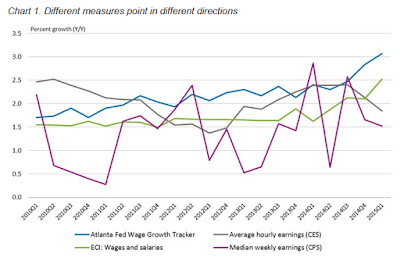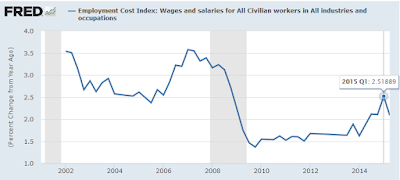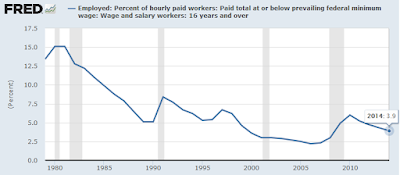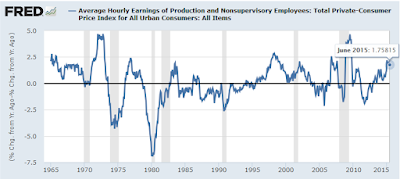Mish's Global Economic Trend Analysis |
- Gulf Countries Now Back Iran Deal; Buchanan Explains Republicans' No-Win Situation
- Ukraine's Ultra-Right Militia Threatens Military Coup
- Wage Growth Accelerating? By How Much? Total Compensation and the Obamacare Effect
| Gulf Countries Now Back Iran Deal; Buchanan Explains Republicans' No-Win Situation Posted: 03 Aug 2015 06:58 PM PDT It was already difficult to imagine Congress mustering up enough support to override a presidential veto of a bill to kill the Iran deal, but it will be impossible now that Kerry Secures Gulf Support. Gulf Arab countries gave cautious backing on Monday to the nuclear deal with Iran, giving the White House an important diplomatic card as it seeks to gain congressional support for the agreement.With that, some Democrats on the fence will likely be convinced. Republicans should too, but most won't. Republicans in No-Win Situation Pat Buchanan is one of few republicans thinking clearly about Iran. Buchanan explains The GOP's Iran Dilemma. It appears that Hill Republicans will be near unanimous in voting a resolution of rejection of the Iran nuclear deal.Does Iran Really Want a Bomb? Buchanan also tackles the question Does Iran Really Want a Bomb? While Iran and its allies are fighting al-Qaida and ISIS, Turkey and our Arab allies are malingerers at best and collaborators at worst.Question Now Moot The question as to whether Iran wants a bomb is now moot. The deal pretty much guarantees Iran won't get one. Yet, Republican war-mongers would rather risk war with Iran than work with a county that actually would make a better ally than Saudi Arabia. Did Iran Threaten to "Wipe Israel off the Map"? The Hitler Card players in both parties keep referring to an alleged statement by Iran's Mahmoud Ahmadinejad to "Wipe Israel Off the Map". The problem is twofold.
Ahmadinejad was actually referring to a statement made by leader Khamenei in which Khamenei said in Persian "Een rezhim-i eshghalgar-i Quds bayad az sahneh-i ruzgar mahv shaved." This means, "This occupation regime over Jerusalem must vanish from the arena of time." Anonymous wire service translators rendered Khomeini as saying that Israel "must be wiped off the face of the map." The myth still persists to this day. President Bush, and Even President Obama have used it when it suits their purpose. And of course, every time that I have spoken favorably of the agreement, I hear the same "wipe the map" nonsense from readers. Rare Victory for Peace Due to political divisiveness, political leaders are never willing to say the other side did anything right. That's why I will never be a political leader. I bash Obama often enough, and for many things. But I equally bash the warmongers who have been wrong every which way, and virtually every time! This was a rare victory for peace. I am proud of the fact that I stood against the Vietnam War, I was against the War in Iraq, and I have been on the right side of the Iran debate from the beginning. I echo Ronald Reagan's former budget director David Stockman who says All Praise To Barack Obama For Stiffing The War Party—- Peace Is Finally Being Given A Chance. I even go one step further and encourage President Obama to resume normal relations with Iran. Only good can come from such talks. Amazingly Nearsighted Fools Walker and Rubio are amazing fools. Sadly, nearly all the Republican candidates don't have their heads on straight regarding this deal. Here's my simple position: I will not vote for any candidate who take the position he or she will kill the deal if elected. Buchanan 2016? Perhaps Pat Buchanan should throw his hat into the ring. Why not? Everyone else has. And the war-mongering talk from the others clearly shows Buchanan is better qualified than the current field leaders. Mike "Mish" Shedlock http://globaleconomicanalysis.blogspot.com |
| Ukraine's Ultra-Right Militia Threatens Military Coup Posted: 03 Aug 2015 12:59 PM PDT Dissatisfied with alleged concessions to Russia, the leader of the Right Sector battalion, Dmytro Yarosh, seeks a nationwide no-confidence referendum in President Petro Poroshenko. The Right Sector is an illegal battalion that Kiev tolerates because its fighters are well-trained, well-equipped, and willing to take on the separatists. There is growing unease in Kiev over the Right Sector, because of Yarosh's call for a vote of no-confidence along with some in the group openly threatening a military coup. Russia claims (likely accurately), Right Sector neo-Nazis were responsible for the violence in the 2014 Ukrainian Revolution that ousted then-President of Ukraine, Viktor Yanukovych. Please consider Fears Grow as Ukraine Rightwing Militia Puts Kiev in its Sights. Fears are growing that Right Sector — the only major volunteer battalion Kiev has not yet managed to bring under regular army control — could turn its fire on the new government itself.Mike "Mish" Shedlock http://globaleconomicanalysis.blogspot.com |
| Wage Growth Accelerating? By How Much? Total Compensation and the Obamacare Effect Posted: 03 Aug 2015 06:51 AM PDT On July 24, the Conference Board asked the question: Is Wage Growth Accelerating? The Board's answer was "All signs point to Yes!" One big question regarding the US economy is whether wage growth is accelerating. You might think that this is a pretty straightforward question to answer, but it's not. There are many measures of wage growth, and they don't all point in the same direction.Four Measures of Wage Growth  The Employment Cost Index (ECI) line in green shows a nice looking 2.6% year-over-year growth. The Atlanta Fed model shows an even bigger gain. Two other measures show stagnation at best. So, which two lines should one believe? Fresh data may provide a clue. Shocking Decline in Employment Cost Index Economists were stunned on Friday July 31 when the Employment Cost Index came in at 0.2% vs. the Bloomberg Consensus ECI estimate of 0.6%. Worse yet, the year-over-year ECI gain plunged from 2.6% to 2.0%. In a shocking result, the employment cost index rose only 0.2 percent in the second quarter which is far below expectations and the lowest result in the 33-year history of the report. Year-on-year, the ECI fell 6 tenths to plus 2.0 percent which is among the lowest readings on record. The record low for this reading is plus 1.4 percent back in the early recovery days of 2009 when, apparently unlike today, there was enormous slack in the labor market.Employment Cost Index Civilian Workers "Wages and Salaries"  Last quarter the year-over-year gain in wages and salaries was 2.52%. That fell to 2.09% in the second quarter. But what about benefits? Employment Cost Index Civilian Workers "Total Compensation"  Obamacare Effect Total compensation fell from 2.57% to 1.98%, larger than the decline in wages and salaries. I believe we all know the answer to this one: Obamacare. Employers are passing on the increased costs of Obamacare to employees. Longer Timeline Provides Better Picture None of the above charts accurately display what is really happening with wages and salaries. The time frame is too short. But we cannot display data we don't have. So let's take a look at a different data series that is more robust. Average Hourly Earnings Production and Nonsupervisory Employees  The above chart puts a different perspective on the recent jump in average hourly earnings. But what about the jump in minimum wages. Should that have a huge impact? The next two charts will help explain. Minimum Wage Employees  Only 3.9% of hourly workers make at or below the federal minimum wage. Paid Federal Minimum Wage Aged 25 Years and Over  Under 600,000 employees aged 25 or under get paid federal minimum wage. For all the brouhaha over minimum wages, the above charts help put things into proper perspective.
Digging still deeper, here are a few more charts to consider. Real "Usual" Weekly Earnings, Employed Fulltime  For those lucky enough to be working fulltime, median real wages are precisely where they were in first quarter of 2002: $341 a week. Assuming those people work 52 weeks a year (not likely), that's a salary of $17,732. Caveats
Growth in Average Hourly Earnings Minus Growth in CPI Let's now take a look at average hourly nominal earnings. Here is a chart I put together in Fred. I took the year-over-year change in average hourly earnings and subtracted the year-over-year change in CPI.  During the recession in the 1970s, average real hourly earnings got clobbered. The opposite happened in 2001 and 2007. Real average hourly earnings are allegedly up 1.76% from a year ago. But, the above chart is also not reflective of the true state of affairs for the same caveats noted above. Obamacare expenses have risen, and so have rental costs. I believe both are understated in the CPI. And renters in some places have been clobbered. Let's hone in on why real hourly earnings are supposedly up 1.76% from a year ago. Here is the same chart overlaid with the year-over-year percent change in CPI. Growth in Average Hourly Earnings Minus Growth in CPI vs. CPI Growth  Group-Think Economic Illiterates Average real hourly earnings are up year-over-year for the precise reason the year-over-year CPI change is up a mere 0.18%. Those renting, those negatively impacted by Obamacare, and those struggling in part-time jobs, are likely to disagree with the notion their wages are going up more than expenses. Couple that with high and rising student debt. Then factor in those on fixed income, struggling with retirement. In spite of the above, economists still wonder why people aren't spending their wage hikes, and "what they save on gasoline". What a collective bunch of economic illiterates. The problem is not lack of rising wages, nor lack of inflation, but rather the Fed's bubble-blowing boom bust cycles for the benefit of banks and the already wealthy. Inflation Fighting Nonsense The red line in the preceding chart shows the absurdity of the Fed's claim they are "inflation fighters". Moreover, and opposite of what the Fed states, and most economists believe, people benefit from falling prices! Ironically, right on the verge of "price stability" (which I define as stable prices but the Fed defines as rising prices) the Fed desperately seeks more damaging inflation that will further destroy the middle class. The Fed's record speaks for itself: bubbles of increasing amplitude over time for the sole benefit of banks, the already wealthy, and government bureaucrats. Here's the final irony: The Fed rails against "income inequality" when they are its number 1 sponsor. Mike "Mish" Shedlock http://globaleconomicanalysis.blogspot.com |
| You are subscribed to email updates from Mish's Global Economic Trend Analysis To stop receiving these emails, you may unsubscribe now. | Email delivery powered by Google |
| Google Inc., 1600 Amphitheatre Parkway, Mountain View, CA 94043, United States | |
No comments:
Post a Comment